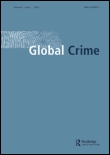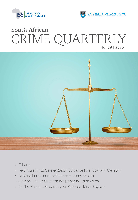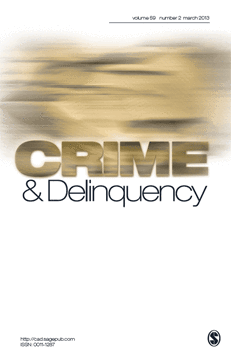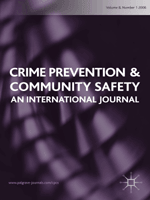
Global Crime
Scope & Guideline
Exploring the Complexities of Crime Across Borders
Introduction
Aims and Scopes
- Transnational Crime Analysis:
The journal emphasizes the study of crime that crosses national borders, including drug trafficking, human smuggling, and organized crime networks, highlighting the complexities of policing and law enforcement on a global scale. - Social Network Analysis:
Utilizing social network analysis as a primary methodology, the journal examines the relationships and interactions within criminal networks, providing insights into the structure and dynamics of organized crime. - Victimology and Gender Studies:
Research often focuses on the experiences of victims, particularly in the context of gendered violence, trafficking, and the societal factors that contribute to these crimes, aiming to inform policy and prevention strategies. - Cybercrime and Digital Offending:
The journal addresses the rise of cybercrime, exploring the implications of technology on criminal behavior, including issues related to digital fraud, online drug markets, and the use of cryptocurrencies in illicit activities. - Crime Prevention and Policy Recommendations:
In addition to analyzing crime, the journal seeks to provide evidence-based recommendations for crime prevention and intervention strategies, drawing on empirical research to inform policymakers and practitioners.
Trending and Emerging
- Machine Learning and Data Analytics in Crime Prevention:
Recent publications have increasingly incorporated machine learning and data analytics to assess crime risks and analyze ownership structures within criminal networks, highlighting the journal's embrace of innovative methodologies. - Drug Trafficking and Substance Abuse:
There is a growing focus on the complexities of drug trafficking, including the role of organized crime in substance abuse and the socio-economic factors influencing these networks, particularly in relation to global health crises. - Intervention Strategies and Bystander Dynamics:
Studies exploring bystander intervention in contexts of sexual violence and other high-risk scenarios are emerging, reflecting a broader interest in understanding social dynamics and preventative measures. - Environmental and Wildlife Crime:
Research on illegal wildlife harvesting and environmental crime is gaining attention, aligning with global discussions on sustainability and conservation, and highlighting the intersection of crime and environmental issues. - Crime-Terror Nexus:
The exploration of the relationships between organized crime and terrorism, particularly in regions affected by both phenomena, is receiving increased focus, indicating a need for integrated approaches to security and policy.
Declining or Waning
- Traditional Organized Crime Structures:
Research focusing on traditional organized crime, such as Mafia structures in specific regions, has seen a decline as newer forms of crime, such as cybercrime and transnational networks, gain more attention. - Localized Crime Studies:
There has been a noticeable reduction in studies that focus solely on localized crime issues without a broader contextual analysis, as the journal increasingly emphasizes global perspectives and interconnectedness. - Static Crime Theories:
The application of static or outdated crime theories, which do not account for the evolving nature of crime due to globalization and technology, appears to be less prevalent in recent publications.
Similar Journals

South African Crime Quarterly-SACQ
Driving evidence-based practices for a more secure future.South African Crime Quarterly (SACQ) is an esteemed open-access journal dedicated to the comprehensive examination of crime and justice issues in South Africa. Published by the Institute for Security Studies, SACQ aims to provide a platform for researchers, practitioners, and policymakers to disseminate innovative research, case studies, and theoretical discussions that address the complexities of crime in the region. Since its transition to open access in 2015, the journal has fostered a wider dissemination of knowledge, promoting accessibility for students and professionals alike. With an ISSN of 1991-3877, SACQ stands out as an essential resource, driving informed dialogue and enhancing the understanding of security challenges in South Africa. The journal encourages submissions that contribute to evidence-based practices and policies, making it a vital tool for those committed to addressing crime and improving safety within communities.

Russian Journal of Criminology
Contributing to global scholarship with a focus on Russian insights.Russian Journal of Criminology (ISSN: 2500-4255, E-ISSN: 2500-1442) is an esteemed academic publication hosted by Baikal State University, dedicated to advancing the field of criminology. As a pivotal resource within the domains of law and social sciences, this journal offers a platform for scholars to disseminate innovative research, critical analyses, and comprehensive studies relevant to contemporary criminological issues. Although coverage has been discontinued in Scopus from 2020, the journal continues to provide valuable insights essential for professionals and researchers alike, with a focus on sociological and political perspectives on crime and justice systems. With its unique Russian context, the journal encourages a diverse array of submissions, facilitating a cross-cultural dialogue on criminology that contributes to global scholarship. Despite its current ranking of 478 out of 685 in law and 908 out of 1243 in sociology and political science, the Russian Journal of Criminology remains a vital resource for those seeking to explore the complexities of criminological phenomena and to further the academic discourse in this critical area of study.

CRIME LAW AND SOCIAL CHANGE
Cultivating Knowledge for a Safer, Just SocietyCRIME LAW AND SOCIAL CHANGE, published by SPRINGER, is a distinguished journal that caters to an interdisciplinary audience including researchers, professionals, and students in the fields of law, social sciences, and forensic medicine. With an ISSN of 0925-4994 and an E-ISSN of 1573-0751, this journal is a vital resource for those looking to explore the dynamic interplay between legal frameworks and societal change, particularly in relation to crime and its implications. As of 2023, it holds a commendable Q2 category ranking in Law and Social Sciences and a Q3 ranking in Pathology and Forensic Medicine, showcasing its impact within these vital domains. With its converged publication years from 1991 to 2024, CRIME LAW AND SOCIAL CHANGE is pivotal in advancing scholarly discourse and offering access to high-quality research that informs both policy and practice. Although not an open access journal, it provides valuable insights to its audience through rigorous peer-reviewed articles, making it an indispensable part of the academic literature in its respective fields.

Crime Science
Empowering researchers to tackle the challenges of crime.Crime Science, published by BMC, is a pioneering open access journal that has been at the forefront of interdisciplinary research since its inception in 2012. With its E-ISSN 2193-7680, this journal plays a crucial role in advancing knowledge across several vital domains including Cultural Studies, Law, Safety Research, and Urban Studies, with a remarkable Q1 ranking across all its categories in 2023. Situated in the United Kingdom, the journal boasts impressive Scopus rankings, placing it in the top 99th percentile for Cultural Studies and 95th percentile for Safety Research, among others. This strategic focus provides a platform for researchers, professionals, and students to explore the complexities of crime and its impact on society, aiming to foster informed discussions and innovative solutions. With a commitment to accessibility and a convergence period extending from 2013 to 2024, Crime Science not only promotes scholarly debate but also seeks to bridge theoretical insights and practical applications, making it an invaluable resource for anyone interested in the multifaceted aspects of crime and safety.

Journal of Experimental Criminology
Advancing Knowledge for a Safer SocietyThe Journal of Experimental Criminology, published by Springer, stands as a beacon of innovation within the realm of criminology and legal studies. With an ISSN of 1573-3750 and E-ISSN 1572-8315, this esteemed journal, based in the Netherlands, explores groundbreaking research and experimental approaches to understanding criminal behavior and justice systems. It proudly resides in the elite Q1 quartile of the law category for 2023, ranking an impressive #37 out of 1025 in Scopus within the Social Sciences _ Law domains, placing it in the 96th percentile among its peers. The journal's objectives are aimed at disseminating high-quality empirical research that informs policy and practice, making it an essential resource for scholars, practitioners, and students who strive to enhance the efficacy of crime prevention and criminal justice interventions. With coverage spanning from 2005 to 2024, the Journal of Experimental Criminology invites contributors from diverse backgrounds to engage in the interdisciplinary dialogue that shapes the future of criminological research.

CRIME & DELINQUENCY
Exploring the complexities of criminal behavior.CRIME & DELINQUENCY, published by SAGE PUBLICATIONS INC, is a premier journal dedicated to advancing the study of criminology and criminal justice. With an esteemed ISSN of 0011-1287 and E-ISSN 1552-387X, this influential journal has been a vital resource since its inception in 1955, continuing to engage in rigorous research and discourse through to 2024. Recognized with a Q1 ranking in both Law and Pathology and Forensic Medicine, CRIME & DELINQUENCY boasts an impressive Scopus ranking, placing it in the top 8% of journals in Social Sciences - Law and the top 31% in Medicine - Pathology and Forensic Medicine. This journal serves as an essential forum for researchers, professionals, and students to explore pressing issues related to crime, delinquency, and their societal implications. Although not an open-access journal, it offers a valuable repository of insightful research and analysis that informs practices and policies within the field. To stay abreast of the latest findings and contribute to the ongoing discourse, CRIME & DELINQUENCY is a must-read for all committed to understanding and addressing criminal behavior in society.

Salus Journal
Fostering Collaboration in Health ResearchSalus Journal, published by Charles Sturt University, is an esteemed open-access journal dedicated to advancing the field of health sciences. Established in 2013, this journal emphasizes the dissemination of innovative research and critical analyses that influence evidence-based practices in healthcare and wellness. With its commitment to making high-quality research accessible to a global audience, Salus Journal plays a crucial role in fostering academic collaboration and dialogue among researchers, professionals, and students alike. Its focus on interdisciplinary approaches encourages contributions across various domains of health, ensuring that it remains a vital resource for the community. The journal is easily accessible online, promoting the visibility and impact of published works. For more information and to stay updated with the latest research in health sciences, visit their website and explore the wealth of knowledge available.

International E-Journal of Criminal Sciences
Exploring the Frontiers of Criminal Science KnowledgeWelcome to the International E-Journal of Criminal Sciences, a distinguished platform dedicated to the rigorous exploration of contemporary issues within the field of criminal sciences. Published by the DMS INT RESEARCH CENTRE, this journal aims to disseminate high-quality research and critical analyses that foster a deeper understanding of criminal behavior, law enforcement strategies, justice systems, and related societal impacts. With its commitment to open access, it ensures that knowledge is readily available to a global audience, promoting inclusivity and academic collaboration across borders. Although specific metrics like impact factor and H-index have yet to be established, its relevance and contribution to the discourse on criminal sciences remain significant. Researchers, professionals, and students are invited to engage with the journal’s valuable insights, as it strives to become a leading resource for innovative thought and evidence-based solutions in the evolving landscape of criminal science.

Crime Prevention & Community Safety
Driving dialogue between theory and practice in safety research.Crime Prevention & Community Safety is a leading academic journal published by Palgrave Macmillan Ltd, dedicated to advancing scholarship in the fields of law, sociology, and safety research. With an ISSN of 1460-3780 and an E-ISSN of 1743-4629, this journal serves as a vital resource for researchers, practitioners, and policymakers interested in the complexities of crime prevention and community safety strategies. Since its inception in 1999, the journal has covered diverse topics and methodologies, making significant contributions to understanding social behaviors and preventative measures in communities. The journal currently holds a respectable Q3 ranking across multiple categories including Law, Sociology and Political Science, and Safety Research, reflecting its importance within these fields as ranked by Scopus. Despite its emphasis on rigorous research, access options are traditional rather than open access, making its scholarly works available through institutional subscriptions. The journal actively seeks to foster dialogue among academics and practitioners, aiming to drive both theoretical understanding and practical intervention in crime and safety initiatives. Join the community of scholars in exploring innovative and impactful strategies aimed at enhancing community safety and reducing crime.

Crime and Justice-A Review of Research
Advancing the discourse on crime and justice.Crime and Justice: A Review of Research is a leading scholarly journal published by the University of Chicago Press, dedicated to advancing knowledge in the fields of sociology and political science, specifically through the lens of crime and justice studies. With an ISSN of 0192-3234 and an E-ISSN of 2153-0416, this academic journal offers a distinguished platform for researchers, practitioners, and students to explore contemporary issues, methodologies, and theoretical advancements within the domain. Ranked in the Q2 category for both sociology and political science as of 2023, it has gained recognition with an impressive Scopus rank of #150 out of 1466 in its field, placing it in the 89th percentile. The journal publishes comprehensive reviews and research articles that inform best practices and policies in crime prevention, law enforcement, and social justice, fostering a deeper understanding of the complexities surrounding crime and societal responses. Though it is not an open-access journal, the insightful research it presents is indispensable for academic discourse and practical application in addressing the multifaceted challenges of crime and justice in contemporary society.